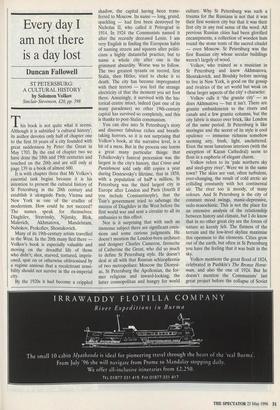Every day I am not there is a day lost
Duncan Fallowell
ST PETERSBURG: A CULTURAL HISTORY by Solomon Volkov Sinclair-Stevenson, £20, pp. 598 This book is not quite what it seems. Although it is subtitled 'a cultural history', its author devotes only half of chapter one to the first 10 years of a city founded with great suddenness by Peter the Great in May 1703. By the end of chapter two we have done the 18th and 19th centuries and touched on the 20th and are still only at page 139 in a book of almost 600.
It is with chapter three that Mr Volkov's essential task begins because it is his intention to present the cultural history of St Petersburg in the 20th century and establish it alongside Paris, Vienna and New York as one of the cradles of modernism. How could he not succeed? The names speak for themselves; Diaghilev, Stravinsky, Nijinsky, Blok, Malevich, Akhmatova, Mandelstam, Nabokov, Prokofiev, Shostakovich.
Many of its 19th-century artists travelled in the West. In the 20th many fled there — Volkov's book is especially valuable and moving on the dreadful life of those who didn't; shot, starved, tortured, impris- oned, spat on or otherwise oblivionised by a regime anxious that a recalcitrant sensi- bility should not survive in the ex-imperial city.
By the 1920s it had become a crippled shadow, the capital having been trans- ferred to Moscow. Its name — long, grand, sparkling — had first been destroyed by Nicholas II, who called it Petrograd in 1914. In 1924 the Communists named it after the recently deceased Lenin. I am very English in finding the European habit of naming streets and squares after politi- cians a highly distasteful practice, but to name a whole city after one is the grimmest absurdity. Worse was to follow. The two greatest tyrants on record, first Stalin, then Hitler, tried to choke it to death. The city has become impregnated with their terrors — you feel the strange electricity of that the moment you set foot there. Amazingly, it survived with the his- torical centre intact, indeed (just one of its many paradoxes) no other 19th-century capital has survived so completely, and this is thanks to post-Stalin communism.
You can dive into St Petersburg's story and discover fabulous riches and breath- taking horrors, so it is not surprising that Volkov's book, at the narrative level, is a bit of a mess. But in the process one learns a great many particular things: that Tchaikovsky's funeral procession was the largest in the city's history, that Crime and Punishment sold only 400 copies a year during Dostoevslcy's lifetime, that in 1858, with a population of halt a million, St Petersburg was the third largest city in Europe after London and Paris (fourth if you include Constantinople), that the Tsar's government tried to sabotage the success of Diaghilev in the West before the first world war and sent a circular to all its embassies to this effect.
Nor is it surprising that with such an immense subject there are significant omis- sions and some curious judgments. He doesn't mention the London-born architect and designer Charles Cameron, favourite of Catherine the Great, who did so much to define St Petersburg style. He doesn't deal at all with that Russian schizophrenia of two metropolises: Moscow the Dionysi- ac, St Petersburg the Apollonian, the for- mer religious and inward-looking, the latter cosmopolitan and hungry for world culture. Why St Petersburg was such a trauma for the Russians is not that it was their first western city but that it was their first city in any real sense of the word. All previous Russian cities had been glorified encampments, a collection of wooden huts round the stone tents of the sacred citadel — even Moscow. St Petersburg was the first Russian city whose secular buildings weren't largely of wood.
Volkov, who trained as a musician in St Petersburg and knew Akhmatova, Shostakovich, and Brodsky before moving to live in New York, is good on the gossip and rivalries of the art world but weak on these larger aspects of the city' s character.
Volkov calls it 'the granite city' — as does Akhmatova — but it isn't. There are granite embankments to the rivers and canals and a few granite columns, but the city fabric is stucco over brick, like London of the same period. St Petersburg is like meringue and the secret of its style is cool opulence — immense richness somehow seeming airy, fresh, light, uncluttered. Even the most luxurious interiors (with the exception of Kazan Cathedral) seem to float in a euphoria of elegant charm.
Volkov refers to its 'pale northern sky and steel-grey river'. Were we in the same town? The skies are vast, often turbulent, ever-changing, the result of cold arctic air colliding constantly with hot continental air. The river too is moody, of many colours. And St Petersburg is the city of constant mood swings, manic-depressive, sado-masochistic. This is not the place for an extensive analysis of the relationship between history and climate, but I do know that in no other great city are the forces of nature so keenly felt. The flatness of the terrain and the low-level skyline maximise this openness to the elements. Cities grow out of the earth, but often in St Petersburg you have the feeling that it was built in the sky.
Volkov mentions the great flood of 1824, celebrated in Pushldn's The Bronze Horse- man, and also the one of 1924. But he doesn't mention the Communists' last great project before the collapse of Soviet power in the late Eighties: the construction of the St Petersburg barrage. Ecologists opposed it — and true, it has been badly designed, allowing the build-up of sewage in a slowly dying lagoon — but it will also be the saviour of St Petersburg in a future of rising sea levels. Nor does he mention that other gift of the Communists — the meticulous rebuilding of the giant fairy-tale palaces outside the city destroyed by the Germans. This was surely the greatest work of restoration ever undertaken by any soci- ety and, like the building of the originals, could only have been accomplished by an autocratic regime.
Which brings us into the present. He has a chapter on Brodsky, but from it Brodsky emerges as stroppy and pretentious, hardly the Nobel laureate of 1987. Of the last 10 years, Volkov has almost nothing to say — perhaps because St Petersburg has so far said little. Someone once asked me to describe the atmosphere there now and I replied, `Rachmaninov with guns', and it is true that new voices have yet to appear. With liberation from totalitarianism, one hoped that St Petersburg would explode into creativity the way Barcelona did after Franco. But where is St Petersburg's Almodovar? Presumably the Russians are still too traumatised by their 20th-century past to speak out in a confident new idiom. Certainly the recent (1995) Penguin Book of New Russian Writing could have been written in the 1930s.
But I too paid the price for my love affair with the city. It left few of my cer- tainties intact and trapped me in paradox- es. Every day I am not there is a day lost — but also a day survived. I am not sure I could survive in St Petersburg any more. Something awful would happen to break me. Or worse — St Petersburg can make you addicted to high drama and suffering. It is all too intense and romantic for a writer, so that one longs for the banal. Whenever I dream of St Petersburg — and it is the ultimate dream city — I never know if my dream will produce a sense of wonder or of nausea. It is not an exaggera- tion to say that it gave me everything — and took everything from me.
I know that what St Petersburg can represent above all — and this is a great human metaphor — is the refusal of the mediocre, the determination against all the odds to be superb. I should like to end there and yet cannot, because in reading this book, as in reading any Russian book, one question keeps returning. Volkov doesn't ask it. Dostoevsky doesn't ask it. Even Aldunatova doesn't ask it. None of them asks it. They celebrate the great Rus- sian experience of suffering, the conse- quent love of life, the warmth and compas- sion which can capture you. They recount the Stalinist terror which I agree with Brodsky in regarding as the worst episode in human history, worse even than the Nazi holocaust, not simply because the number of exterminations was greater but because there wasn't even the primitivist concept of one tribe trying to kill off another tribe to help one understand it — it was Russians systematically betraying, torturing, killing other Russians. And yet this was only the most extreme example of an abiding theme in Russian history. Therefore that question which I've never seen asked, which it seems they cannot bear to ask, is: why are Russians so nasty to other Russians?



























































 Previous page
Previous page